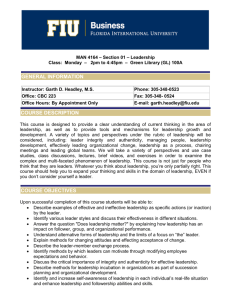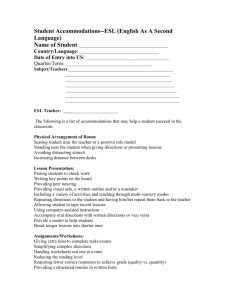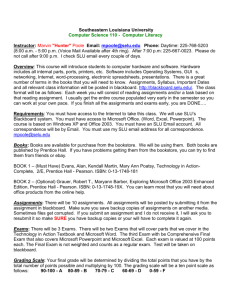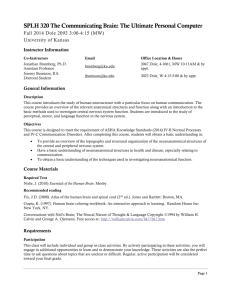Syllabus - FIU College of Business
advertisement
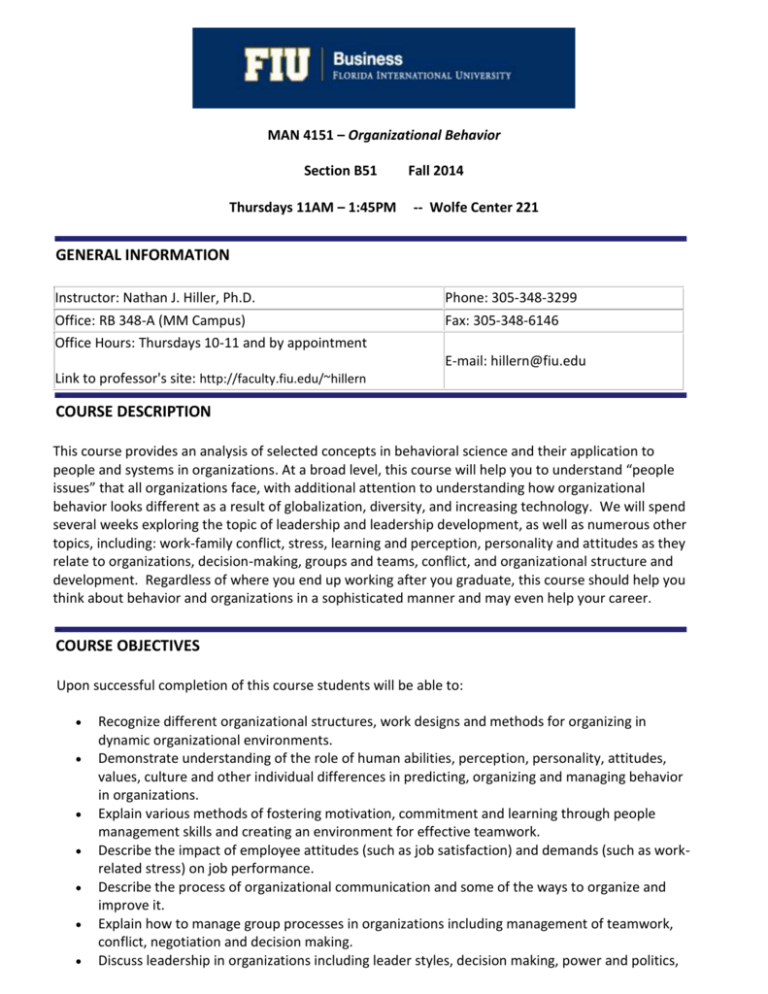
MAN 4151 – Organizational Behavior Section B51 Thursdays 11AM – 1:45PM Fall 2014 -- Wolfe Center 221 fgfgfgf GENERAL INFORMATION Instructor: Nathan J. Hiller, Ph.D. Phone: 305-348-3299 Office: RB 348-A (MM Campus) Office Hours: Thursdays 10-11 and by appointment Fax: 305-348-6146 E-mail: hillern@fiu.edu Link to professor's site: http://faculty.fiu.edu/~hillern fgfgfgf COURSE DESCRIPTION This course provides an analysis of selected concepts in behavioral science and their application to people and systems in organizations. At a broad level, this course will help you to understand “people issues” that all organizations face, with additional attention to understanding how organizational behavior looks different as a result of globalization, diversity, and increasing technology. We will spend several weeks exploring the topic of leadership and leadership development, as well as numerous other topics, including: work-family conflict, stress, learning and perception, personality and attitudes as they relate to organizations, decision-making, groups and teams, conflict, and organizational structure and development. Regardless of where you end up working after you graduate, this course should help you think about behavior and organizations in a sophisticated manner and may even help your career. fgfgfgf COURSE OBJECTIVES Upon successful completion of this course students will be able to: Recognize different organizational structures, work designs and methods for organizing in dynamic organizational environments. Demonstrate understanding of the role of human abilities, perception, personality, attitudes, values, culture and other individual differences in predicting, organizing and managing behavior in organizations. Explain various methods of fostering motivation, commitment and learning through people management skills and creating an environment for effective teamwork. Describe the impact of employee attitudes (such as job satisfaction) and demands (such as workrelated stress) on job performance. Describe the process of organizational communication and some of the ways to organize and improve it. Explain how to manage group processes in organizations including management of teamwork, conflict, negotiation and decision making. Discuss leadership in organizations including leader styles, decision making, power and politics, ethics & integrity, and performance management. Identify methods for overcoming resistance to change and carrying out organizational development processes. fgfgfgf MAJOR & CURRICULUM OBJECTIVES TARGETED Understand and apply principles of management in the following areas: planning, organizing, control, leadership, and social responsibility. Creating competitive advantage in organizations through human capital Understand the domestic and global economic environments of organizations Communication ability Critical thinking fgfgfgf TEXTBOOK There is one required textbook Textbook: Organizational Behavior Hitt, Miller & Colella Wiley, 2011, 3rd Edition. ISBN: 978-0-470-52853-2 I will also distribute readings in class and via Blackboard – sometimes we will do short readings in class, and other times you’ll be responsible to read these short articles outside of class time and be prepared to discuss them in class. gfgfgf TEACHING METHODOLOGY This course utilizes a number of methods in helping you to meet the learning objectives, including: activities, discussions, case-studies, examination of current events as they relate to organizational behavior, and a look at research findings and cumulated knowledge from the textbook and from the professor’s expertise. In addition, the learning experience is enhanced when students participate – which is an expectation of the course. The combination of teaching and learning methodologies employed seeks to maximize learning and current/future application of the principles learned. fgfgfgf COURSE PREREQUISITES MAN3025 OR MAN 3022 – with a grade of C or higher. fgfgfgf COMMUNICATING WITH THE INSTRUCTOR The best way to get in touch with me outside of the class meeting day is by email. I am also usually available both before and after class. This course utilizes Blackboard (for posting of notes, syllabus, and submission of assignments). Please note that I DO NOT check my Blackboard mail. You will not get a response if you send an email through Blackboard. fgfgfgf GRADING Course Requirements Weights Best 2 of 3 Exams (25% each) 50% (1) Case Write-Up (20%) 20% (1) Team Assignment (15%) 15% Participation 15% Total 100% The following scale is used to assign final grades. Percentages will be rounded up if the value is .5 or greater. In other words, an 85.5% would be rounded up to an 86%. An 85.4% would be rounded down to an 85%. Letter Grade A AB+ B Range 94-100% 90-93 87-89 84-86 Letter Grade BC+ C C- Range 80-83 77-79 74-76 70-73 Letter Grade D F Range 65-69 <65 fgfgfgf ASSURANCE OF LEARNING As a college, we care about the quality of the business education we are providing you. More information on the College’s commitment can be found on the College of Business website. Fgfgfgf QUIZZES EXAMS There will be three exams that will consist of a combination of multiple choice, fill-in-the-blank, and short-answer questions. You can throw out your lowest score. Your two highest scores will each contribute toward 25% of your final grade. See schedule (below) for exam dates. Make-up Policy: Students are expected to complete exams and assignments on time. There are no make-up exams. If you miss an exam for any reason, that exam is your lowest score and will be thrown out. fgfgfgf PARTICIPATION Students will be assigned a score based on their participation in class. I expect that you are prepared for each class session and actively engaged in class sessions. I do not take attendance, and realize that you may have to miss one, or perhaps two classes during the semester, but beyond that and you will likely see your Discussion grade suffer – if you’re not present, you can’t participate. Your score for class participation will be based on participation in class. The general rubric that I use is the following: 15 points – actively prepared for and involved in class (including regular attendance) with insightful comments. 12-14 points – attends class and participates. Good contribution at times, but not excellent. 9-11 points – mediocre participation (and/or attendance) in both class. 7-8 points – occasional participation, but lacking preparation, regularity and insight. 0 points – failure to participate in class. I expect that you are actively engaged in the class and contributing to the discussion and flow of the class. Each semester, a few students are surprised that I really do pay attention to participation when they receive a very low score. Fgfgfgf ASSIGNMENTS There is one team assignment and one case-study write-up. Assignments are due at 10:55AM - late assignments are docked 20% per day, starting at the due-date/time. Please note that all assignments need to be submitted via Blackboard. You can find a link to submit the assignment under the “Assignments” tab. Case Study: There is one case study write-up. Instructions will be given in Week 2 of the course. The case study is due September 18th Team Assignment: The team assignment should be completed in groups/teams of NO MORE THAN 3 members. You only need to hand in one assignment for the team, but be sure that all team-members’ names are listed. Instructions for completing the team assignments will be given about 2-3 weeks before the assignment is due. The assignment is due November 20th. Fgfgfgf DISABILITY NOTICE If you have a disability and need assistance, please contact the Disability Resource Center. Upon contact, the Disability Resource Center will review your request and contact your professors or other personnel to make arrangements for appropriate modification and/or assistance. Fgfgfgf RELIGIOUS HOLIDAYS The University's policy on religious holy days as stated in the University Catalog and Student Handbook will be followed in this class. Any student may request to be excused from class to observe a religious holy day of his or her faith. fgfgfgf RULES, POLICIES, and ACADEMIC MISCONDUCT Assignments from the text and other resources are listed below for each class session. Students are expected to pace their learning according to the posted course assignments. It is expected that interactive learning and teaching will enrich the learning experience of all students, and that each student will work in partnership with the professor to create a positive learning experience for all. Student engagement is a necessary condition for an effective learning experience, and includes contributions to debate and discussion (if any), positive interactive learning with others, and an enthusiastic attitude towards inquiry. Everyone is expected to be a positive contributor to the class learning community, and students are expected to share the responsibility of teaching each other. Statement of Understanding between Professor and Student Every student must respect the right of all to have an equitable opportunity to learn and honestly demonstrate the quality of their learning. Therefore, all students must adhere to a standard of academic conduct, demonstrating respect for themselves, their fellow students, and the educational mission of the University. As a student in the College of Business taking this class: I will not represent someone else’s work as my own I will not cheat, nor will I aid in another’s cheating I will be honest in my academic endeavors I understand that if I am found responsible for academic misconduct, I will be subject to the academic misconduct procedures and sanctions as outlined in the Student Handbook Failure to adhere to the guidelines stated above may result in one of the following: Expulsion: Permanent separation of the student from the University, preventing readmission to the institution. This sanction shall be recorded on the student's transcript. Suspension: Temporary separation of the student from the University for a specific period of time. Additionally the following two documents should be used by every student in business classes that require individual or group written assignments: Certification of Authorship Assignment Cover Page (Individual) Certification of Authorship Assignment Cover Page (Groups) For details on the policy and procedure, see the University’s policies under Academic misconduct. fgfgfgf EXPECTATION OF THIS COURSE My job is to create an environment where you can maximally learn. I love teaching, and seek out ways to make the material engaging and relevant. In the end, however, the responsibility for learning is up to you. Being up to speed with course material, knowing content and ideas for exams, turning in excellent assignments and case write-ups, and actively participating are all expected in this course. If you meet expectations, I believe that you’ll get a lot of useful tools and ideas out of this course that you can use in your current and future work situations! fgfgfgf COURSE CALENDAR Please note that short assigned readings (for example, an article about a relevant topic) will be given about once every 2-3 weeks and will be available via Blackboard. Date Topic Assignment August 28 Course Introduction & Overview -Familiarize yourself with the course syllabus and deadlines. Read Chapter 1 September 4 Organizational Behavior in a Global Context Chapter 3 September 11 Traps and Processes in Learning and Perception Chapter 4 September 18 “Whatever!” Personality, Attitudes, and the “G” Factor Case Study # 1 due Chapter 5 September 25 Work Motivation Chapter 6 October 2 Exam # 1 Exam #1 Chapter 1 October 9 Going Postal. Workplace Stress Chapter 7 October 16 What is Leadership? Chapter 8 October 23 If Good Communication is Common Sense, Then Why Do People Do It So Poorly? Chapter 9 Why Most Groups and Teams are Less Than The Sum of Their Parts Chapter 11 How We Make Decisions and What to Do About It Chapter 10 November 6 Exam #2 Exam #2 November 13 A Different Approach to Conflict, Power, Politics& Diversity Chapter 12 & 2 November 20 Organizational Structure and Culture Team Assignment Due Chapter 13 November 27 How to Change an Organization Chapter 14 December 4 Tying Up Loose Ends No chapter December 11 Exam # 3 **9:45 – 11:45 in classroom** Exam #3 October 30 Please contact the professor directly if you have any questions. College of Business Administration - Enterprise Technology Center (RB 107) Tel: (305) 348-6259 | Fax: (305) 348-6882 | Email: cbasys@fiu.edu Copyright © 2006 FIU College of Business

